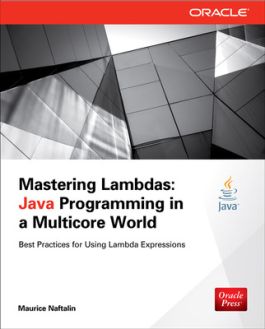Mastering Lambdas
1st Edition
0071829628
·
9780071829625
© 2015 | Published: September 22, 2014
Publisher's Note: Products purchased from Third Party sellers are not guaranteed by the publisher for quality, authenticity, or access to any online entitlements included with the product.The Definitive Guide to Lambda ExpressionsMastering Lambda…
Read More
Purchase Options
Request Review Copy
Chapter 1. Taking Java to the Next Level
Chapter 2. The Basics of Java Lambda Expressions
Chapter 3. Introduction to Streams and Pipelines
Chapter 4. Ending Streams: Collection and Reduction
Chapter 5. Starting Streams: Sources and Spliterators
Chapter 6. Stream Performance
Chapter 7. API Evolution with Default Methods
Chapter 2. The Basics of Java Lambda Expressions
Chapter 3. Introduction to Streams and Pipelines
Chapter 4. Ending Streams: Collection and Reduction
Chapter 5. Starting Streams: Sources and Spliterators
Chapter 6. Stream Performance
Chapter 7. API Evolution with Default Methods
Publisher's Note: Products purchased from Third Party sellers are not guaranteed by the publisher for quality, authenticity, or access to any online entitlements included with the product.The Definitive Guide to Lambda Expressions
Mastering Lambdas: Java Programming in a Multicore World describes how the lambda-related features of Java SE 8 will enable Java to meet the challenges of next-generation parallel hardware architectures. The bookexplains how to write lambdas, and how to use them in streams and in collection processing, providing code examples throughout. You'll learn how to use lambda expressions to take full advantage of performanceimprovements provided by today's multicore hardware. This Oracle Press book covers:
- Why lambdas were needed, and how they will change Javaprogramming
- Syntax of lambda expressions
- The basic operation of streams and pipelines
- Using collectors and reduction to end pipelines
- Creating streams
- Spliterators, the fork/join framework, and exceptions
- Examining stream performance with microbenchmarking
- API evolution using default methods

